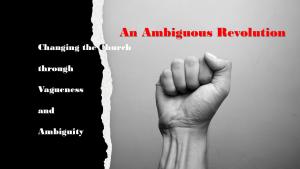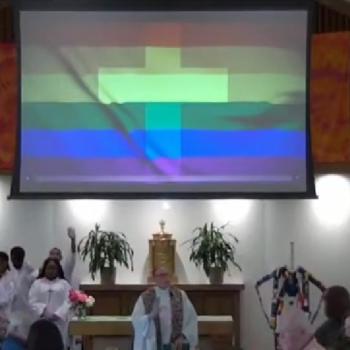In a recent article concerning the five dubias addressed to Pope Francis, I concluded that the faithful require greater clarity from the Holy See. Not alone in my conclusion, I then posted an open letter from a priest in the trenches also calling for greater clarity from Pope Francis directly. Sadly, for this priest, the Pope’s ambiguity harms his ministry. After reading articles from various authors and the comments by those who read my blog, it hit me—maybe ambiguity and vagueness are the point.
Using ambiguous and vague language in response to simple “yes” and “no” questions (the traditional responses to dubias) provide just enough space to maneuver for those who wish to change the Church. In other words, ambiguity allows for otherwise forbidden actions (the blessing of same-sex couples) to enter the “praxis” of the faithful. Therefore, this “revolution” happens in real time and under the protection of vague and ambiguous language.
Case in Point
Dawn Eden Goldstein at Where Peter Is (WPI) recently wrote a defense of the Pope’s response to the dubias. In her article, Blessings undisguised: Debunking disinfo on Francis and gay unions, Goldstein goes into great lengths to demonstrate that Pope Francis’ responses fall well within the pale of Church teaching. For the most part, Goldstein does an excellent job in her analysis of the exchange. However, her attempt to make concrete the ambiguities found in Pope Francis’ responses lead to more questions than answers. For example:
Three times the Holy Father emphasizes that, to grow in our walk with God, we need grace to help us “live better.” He has already said that the Church can in no way permit a blessing that would “suggest that something that is not marriage is recognized as marriage.” So he is not speaking here of the blessing of a sexual union. He is speaking rather of a situation in which individuals seek a blessing to help them grow in their walk with God. To those who would prevent a priest from raising his hand to bless individuals who are living contrary to the Church’s teachings, Francis effectively asks: how are people to receive the grace to live up to the demands of the Gospel, if the Church denies it to them at every turn?
Okay…If the Church does not “suggest” that it bless something considered marriage as marriage, it is okay to offer blessing to whom exactly? Goldstein admits the Pope meant those “living contrary to the Church’s teachings.” Moreover, since these couples live contrary to Church teaching, they most likely exist in civil marriages. These “marriages,” while not considered as sacramental marriages by the Church, are considered marriages by civil authorities (and broader society and many within the Church herself). Therefore, to the observant, a “blessing” takes place that looks like a marriage blessing, smells like a marriage blessing, and acts like a marriage blessing, but is not “officially” called a marriage blessing. Ah, the wonders of ambiguity!
To What Purpose?
To what purpose does the Church offer her blessing to those living contrary to Church teaching? Goldstein answers by paraphrasing the Pope:
…to grow in our walk with God, we need grace to help us “live better.”
But…how can those who live and persist in objective sin and disobedience to God and His Church grow in their walk via a Church blessing if they actively reject the grace needed to help them “live better?” Does the “blessing” also include a call to repentance and reconciliation? This would fall under what the Church considers the “best life.” A “blessing” that ignores and denies God’s moral law is no “blessing” at all. It demands that God accept us on our terms, not His.
The King’s Wedding Feast
In Matthew 22:1-14, Jesus compares the kingdom of God to a king who gives a wedding feast for his son. First, the invited refuse to come and killed the king’s servants who invited them. This caused the king to destroy the murderers and their cities. Next, the king sent his servants to invite any they could find, both good and bad. These did come and the wedding hall was full of guests. The king then entered the feast…
“But when the king came in to look at the guests, he saw there a man who had no wedding garment. And he said to him, ‘Friend, how did you get in here without a wedding garment?’ And he was speechless. Then the king said to the attendants, ‘Bind him hand and foot and cast him into the outer darkness. In that place there will be weeping and gnashing of teeth.’ For many are called, but few are chosen.” [emphasis added]
The king, on seeing one of his guests without a wedding garment, immediately ordered this guest bound and cast out. Seems harsh…Throwing a person out for wearing the wrong cloths to a wedding? What about God’s indiscriminate love? And Jesus uses this parable as an example of the kingdom of God… You see, the guest without a wedding garment represents those who want to meet God on their own terms. By attending the wedding of the king’s son without a wedding garment, the guest demanded the king accept him on his terms. Sound familiar?
Vagueness, Ambiguity, and Sophistry
In a personal statement to Pope Francis, one of the dubia cardinal, Joseph Zen Ze-kiun of Hong Kong observed that the ambiguity the language used will lead to confusion on matters of utmost importance. He states:
How can the Church, in such an important matter, leave the people without a clear rule and trust individual discernment? Isn’t this how a chaos of casuistry [sophistry] very dangerous for souls will break out?
In other words, the Church must provide a clear rule or place souls at risk. Moreover, while ambiguity provides the space for revolutionaries within the Church room to maneuver, the chaos this maneuvering creates costs souls. And, by their very nature, “blessings” cannot put souls at risk.
A Blessing in Disguise
According to the Catechism, a blessing represents an encounter between God and man.
2626 Blessing expresses the basic movement of Christian prayer: it is an encounter between God and man. In blessing, God’s gift and man’s acceptance of it are united in dialogue with each other. The prayer of blessing is man’s response to God’s gifts: because God blesses, the human heart can in return bless the One who is the source of every blessing.
This “basic movement” can in no way involve harm to the human soul seeking God’s gift, for this gift is participation in the divine life of God Himself.
1 God, infinitely perfect and blessed in himself, in a plan of sheer goodness freely created man to make him share in his own blessed life. For this reason, at every time and in every place, God draws close to man. He calls man to seek him, to know him, to love him with all his strength. He calls together all men, scattered and divided by sin, into the unity of his family, the Church. To accomplish this, when the fullness of time had come, God sent his Son as Redeemer and Savior. In his Son and through him, he invites men to become, in the Holy Spirit, his adopted children and thus heirs of his blessed life. [emphasis added]
Therefore, we seek God’s blessing to share in God’s blessed life. In this sense, the sin that scatters and divides us from God and each other is replaced with unity. Conversely, the use of ambiguous and vague language to allow for “blessings” which contradict the very nature of blessings places souls at risk and gives those receiving these “blessings” the false impression that God accepts them on their terms and not His.
Final Thoughts…
To conclude, let’s predict how this unfolds…Ambiguous and vague language provides the spaces to maneuver for revolutionaries who wish to change the Church. Within these spaces, abuses will arise under the protection of this same ambiguous and vague language. In time, the revolutionaries hope the abuses become so ingrained as to become the “praxis” of the Church. So, while the Church has not “changed” her “official” teaching on “blessing” same-sex marriage, this fact now becomes moot because these “blessings” are now integrated into the everyday life of the Church (her praxis). An ambiguous revolution, indeed!
Finally, for a great analysis of the dubias, please check out show 1220 of The Catholic Current with Fr. Robert McTeigue.
Thank you!
Read The Latin Right’s other writing here.














